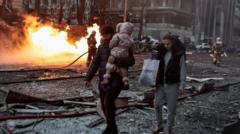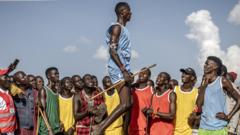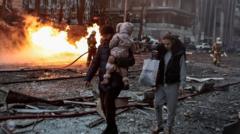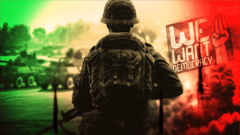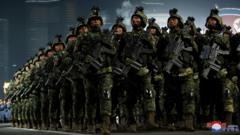The assassination of Russian general Igor Kirillov may seem like a significant event for Ukraine's intelligence operations, but experts suggest it is unlikely to change the dire situation on the battlefield.
Killing of Russian General Raises Questions on Impact in Ukraine Conflict

Killing of Russian General Raises Questions on Impact in Ukraine Conflict
Ukrainian intelligence achieves a symbolic victory with the assassination of General Igor Kirillov, yet Western analysts caution it won't shift the dynamics of the ongoing war.
The recent assassination of Russian General Igor Kirillov in Moscow represents a notable achievement for Ukrainian intelligence, reflecting years of development aimed at executing operations behind enemy lines. Kirillov's killing, occurring in broad daylight on a Moscow street, is expected to instill fear within the Russian elite and could exacerbate tensions within the Kremlin. The general had allegedly directed the usage of banned chemical weapons against Ukrainian forces, making his death particularly meaningful for Ukraine.
Despite the tactical success, analysts and Western officials assert that this event will not meaningfully enhance Ukraine's overall military position against Russia. As pointed out by Douglas London, a former CIA station chief, the assassination may momentarily shock Russian leadership, but it is unlikely to impede their military operations or strategies. Current conditions on the battlefield are grim for Ukraine, with forces unable to retain ground against a better-equipped Russian army.
On the eastern front, Ukrainian troops are facing increasing Russian advances, particularly around strategic locations such as Pokrovsk, Kramatorsk, and Sloviansk in the Donetsk region. The ongoing hostilities have prompted significant evacuations, with over 300,000 residents urged to leave the area due to the worsening situation. Additionally, the Russians, bolstered by North Korean fighters, are intensifying their counteroffensive to reclaim the territories occupied by the Ukrainians in the Kursk region since the previous summer.
While the assassination signals the evolving landscape of intelligence warfare, the overarching narrative remains one of strategic challenges for Ukraine as it grapples with a resilient and formidable Russian military force.
Despite the tactical success, analysts and Western officials assert that this event will not meaningfully enhance Ukraine's overall military position against Russia. As pointed out by Douglas London, a former CIA station chief, the assassination may momentarily shock Russian leadership, but it is unlikely to impede their military operations or strategies. Current conditions on the battlefield are grim for Ukraine, with forces unable to retain ground against a better-equipped Russian army.
On the eastern front, Ukrainian troops are facing increasing Russian advances, particularly around strategic locations such as Pokrovsk, Kramatorsk, and Sloviansk in the Donetsk region. The ongoing hostilities have prompted significant evacuations, with over 300,000 residents urged to leave the area due to the worsening situation. Additionally, the Russians, bolstered by North Korean fighters, are intensifying their counteroffensive to reclaim the territories occupied by the Ukrainians in the Kursk region since the previous summer.
While the assassination signals the evolving landscape of intelligence warfare, the overarching narrative remains one of strategic challenges for Ukraine as it grapples with a resilient and formidable Russian military force.





